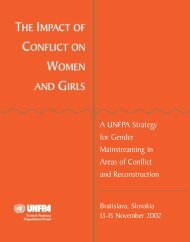Sexual exploitation and abuse by UN peacekeepers - PeaceWomen
Sexual exploitation and abuse by UN peacekeepers - PeaceWomen
Sexual exploitation and abuse by UN peacekeepers - PeaceWomen
You also want an ePaper? Increase the reach of your titles
YUMPU automatically turns print PDFs into web optimized ePapers that Google loves.
42<br />
Carlyn van der Mark<br />
Political Science Master Thesis - <strong>Sexual</strong> <strong>exploitation</strong> <strong>and</strong> <strong>UN</strong> <strong>peacekeepers</strong><br />
is dependent on proxy measurements. Despite not being able to find concrete measurements,<br />
it is still significant to consider accountability <strong>and</strong> implementation of legal provisions as a<br />
failure of the zero tolerance policy. The failure of the zero tolerance policy is dependent on<br />
troop contributing countries enforcing a zero tolerance in their legal system. This section has<br />
highlighted through table 5 that the U.N the domestic government do not always align with<br />
regards to st<strong>and</strong>ards of consent of sex <strong>and</strong> prostitution. The un-clarity of what is allowed <strong>and</strong><br />
what isn‟t can account for feelings of impunity <strong>by</strong> <strong>peacekeepers</strong>. Hence, the zero tolerance<br />
policy fails in creating a strong enforcement body against allegations of sexual <strong>exploitation</strong><br />
<strong>and</strong> <strong>abuse</strong> as well as enforcement of age of consent <strong>and</strong> legality of prostitution.<br />
Section Three: Looking at the social status of women <strong>and</strong> indicators of poverty as<br />
determining factors for sexual <strong>exploitation</strong> <strong>and</strong> <strong>abuse</strong><br />
In underst<strong>and</strong>ing which factors cause for the failure of the zero tolerance policy one needs to<br />
underst<strong>and</strong> the domestic context within which acts of sexual <strong>exploitation</strong> <strong>and</strong> <strong>abuse</strong> occur.<br />
The previous sections have elaborated on the strategies to combat social masculinities <strong>and</strong><br />
focused on the legal aspects in the failure of the zero tolerance policy. This section will now<br />
explore why transactional sex, otherwise known as survival sex, occurs <strong>by</strong> incorporating a<br />
women‟s perspective. By using a liberal feminist approach, unequal social factors will be<br />
highlighted that cause for some women <strong>and</strong> young teenage girls to be involved with forms of<br />
transactional sex with U.N <strong>peacekeepers</strong>. The indicators that is used to highlight the unequal<br />
social factors are the Gender Inequality index <strong>and</strong> Multi-dimensional Poverty index.<br />
Hypothesis III shall be tested in this section. Hypothesis III indicates that the more emphasis<br />
that is placed within the domestic community of the peacekeeping mission, then the greater<br />
the decrease in sexual <strong>exploitation</strong> <strong>and</strong> <strong>abuse</strong>.<br />
This section will be split into three parts. The first will indicate the social circumstances in<br />
the DRC <strong>and</strong> Haiti context. The second section will highlight the importance of recognizing<br />
the social <strong>and</strong> economic context in preventing future allegations of sexual <strong>exploitation</strong> <strong>and</strong><br />
<strong>abuse</strong>. Lastly, the third section will see how the zero tolerance policy comprehends<br />
environmental factors that cause for circumstances of sexual <strong>exploitation</strong> <strong>and</strong> <strong>abuse</strong>.<br />
3.1 Gender inequality <strong>and</strong> Poverty index<br />
The table below uses data collected from the Gender Inequality Index along with the Multi-<br />
Dimensional Index. The data is used to highlight the social circumstances within the DRC




![IANSA [PDF, 2MB] - PeaceWomen](https://img.yumpu.com/25206379/1/190x123/iansa-pdf-2mb-peacewomen.jpg?quality=85)
![Commitments Sample [PDF, 93KB] - PeaceWomen](https://img.yumpu.com/25206331/1/190x245/commitments-sample-pdf-93kb-peacewomen.jpg?quality=85)










![A Toolkit for Advocacy and Action [PDF, 260KB] - Peace Women](https://img.yumpu.com/25205989/1/190x245/a-toolkit-for-advocacy-and-action-pdf-260kb-peace-women.jpg?quality=85)